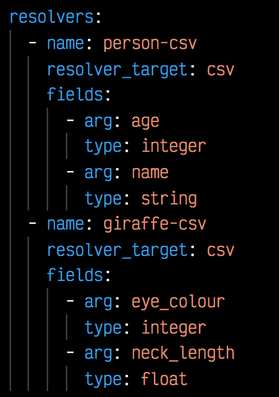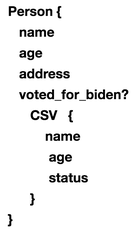One of the many ways to use Hasura is to allow power users to interact with an API through Hasura instead of a website designed primarily for visualising data. One often requested feature that was particularly useful for my team was the ability to download CSV data which a site might normally provide a browser interface for.
This service will spin up a remote GraphQL schema from a yaml file which will allow the quick creation of custom field/s that can forward the results from a Hasura resolver to the hasura-csv service, where it will be written to the output folder as a csv file.
Lets say that I have a Person resolver in my Hasura schema which looks like this
But I only want their names and ages.
First of all I create the following hcsvconfig.yaml (copy the example.hcsvconfig.yaml for a quick leg up).
I need to create a target resolver in my yaml which Hasura will connect to.
!!!This must be a different name from the actual resolver we want to output from!!!
(i use person_csv here for the Person resolver).
Here i've also added a seperate link for the giraffe resolver 🦒 add as many fields and resolver links as you like. Each remote resolver will correspond to one Hasura resolver.
npm install and run the service with npm run start.
- Go to your Hasura console and select REMOTE SCHEMAS.
- Enter the url of hasura-csv (by default this will be http://localhost:5000/graphql)
- Name your remote schema (i generally use 'CSV')
- Select the resolver you wish to output in the DATA tab and select relationships and Add a remote schema relationship
Now name the field which you will want to use in the Person resolver to indicate you want to also send the output of the resolver to hasura-csvs person-csv, i use CSV (this can be the same for every table if you want)
Now to output to hasura-csv simply add the CSV field to the resolver you have linked it to in a UI query, for example:
The subfields will only affect the display in Hasura, the linked fields only will be transmitted, status is the optional 'OK' response from the service.
The output will be written to './output/person_csv_{{timestamp}}'
cp ./etc/.example-env ./etc/.env
cp ./example.hcsvconfig.yaml ./hcsvconfig.yaml
Then set secrets and paths in .env, and setup your yaml configuration before running.
-
Typescript is not yet doing much.
-
I have only tested this on a couple of thousand rows, please feel free to PR 🙏
npm start
npm run build build only
npm run prettier prettier code formatting
npm run lint run linter
npm run lint-ts run linter on typescript




